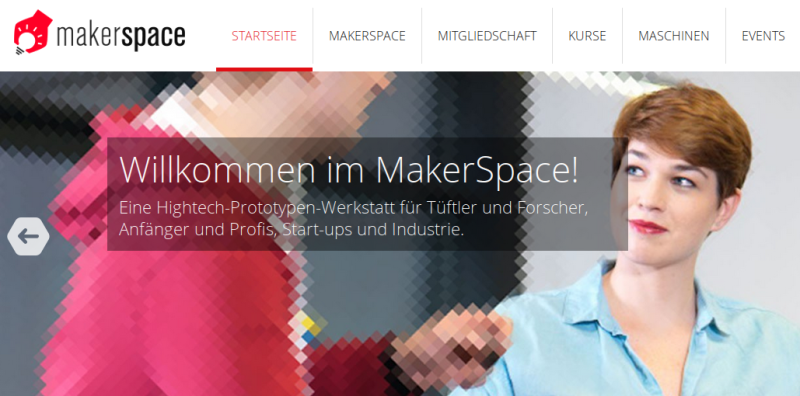The German Patent and Trademark Office has denied the application from UnterhehmerTUM for a trademark on the word “Makerspace”. It wasn’t likely to be a threat to the community anyway, but now it’s entirely off the table. So Kwartzlab Makerspace, Houston Makerspace, Rochester Makerspace, Anchorage Makerspace, … you can all breathe easy!
To be fair, there was never any danger, just a misunderstanding. We reported earlier on the trademark application and within a day or so got an official reply in the comments from Phil (“Mr. Mobile”) Handy that they weren’t looking to enforce anything, but were just essentially trying to make sure that nobody else could pull the rug out from under them. (Thanks [Gentleman Nerd] for pushing them on this.)
The makerspace in question is an open-access offshoot of a business incubator that’s associated with Munich’s Technical University, and it looks like they pumped a couple million Euros into the deal, so there were doubtless layers of bureaucracy that wanted to make sure that their asses were legally covered.
Anyway, the Trademark Office did the right thing, denying the trademark because it wasn’t “unique”, and the makerspace looks awesome. All’s well that ends well.
















Thanks to all for the positive coverage and “closure” on this matter.
Let us all now move forward and build the Germans Maker Scene !
Thanks also to your compliment that our MakerSpace looks awesome ! We are very proud of what we have gotten started.
We invite any/everyone to come out and visit us. Mention this article :-)
….. also looking forward to seeing all Bavarian Makers at this weekends Make Munich Trade Show.
Cheers
Phill Handy
Small correction, the name is ‘UnternehmerTUM’ not ‘UnterhehmerTUM’
I assume this is the intended outcome. In the UK you can try and trademark a logo/etc, however if it is too similar to another or too generic it will be rejected. However, now that this rejection has occurred and been recorded, no one else can attempt to take control of it if I’m right thus protecting it in an in-direct way.
@ UnternehmerTUM: “Niemand hat die Absicht, eine Mauer zu errichten!”
question here: how much chalk can you eat?
So here’s the problem. You can’t simultaneously register a trademark to prevent someone else from “pulling the rug out” and then also not enforce the trademark. You actually have to enforce the trademark in order to keep it. Sounds like backpedaling after seeing the negative reaction to this. Glad it’s too generic to trademark anyway, but in the future never trust anyone who says they’re claiming something just to have it and won’t ever misuse it.
Except if that happens doesn’t it become “genericized” and therefore nobody can successfully register and sue the company for using it? So basically exactly what they were aiming for?
This wouldn’t be the first time this happened, by the way. I’m having flashbacks to another similar case a year or two ago, with a very similar outcome.
You don’t have to register a trademark in order for a term to become generic (as proven by the failure of this registration). I mean, you can trust that this company paid millions trying to get this trademark in order to ignore it for the good of mankind. But it’s also easy to try to grab something for yourself, fail, be left with a lot of bad will in the community, and try to claim you were only protecting them.
Could they offer a perpetual license for a Euro… and give you a Euro on the side?
I some[entity] is such a jerk as to trademark something like “makerspace”,
Then makers will find another name to use…
What’s that old saying (I really should look it up)
The Internet views censorship as a defect and finds a route around it
P.s.
(I’m not accusing those German folks of being jerks, I admire the idea of protecting the word for all, I’m just speaking/typing generically)
I still hate the term “maker”, yet it seems to fit the German scene well. Let them keep it. I’ll still be a hobbyist.
Ditto. I never liked the term either.
My prediction: In less than five years Apple will file a trademark application for “Makerspace” to the US trademark office and get it accepted.
US and EU patent offices are independent, Apple would have to file separate claim to European Patent Office which will reject claim right away due to previous rejections.
The EU is on verge of collapse right now as “multiculturalism” is allowing a certain “monoculture” to run roughshod
over European rights. Many localized cultures are seeking to be freed from the tyranny of the EU and erect borders to safeguard their communities.
The EU has certain residents who use words like “multiculturalism” as if it’s swearing, and think that Muslims are going to turn the place into a Sharia Islamic state, even though that’s impossible and most Muslims don’t want it anyway. They’ve hated the EU from the start since it’s full of foreigners. Fortunately nobody takes any notice of these sort of people.
Gee that’s funny they were trying to copyright “Makerspace” in Germany, I thought the german word for Makerspace would be Grosserkraftkuntsraumundsauerkraut.
Maker -> Hersteller? Macher is probably a better fit though, it means someone who makes things (happen).
Space -> Raum.
Machraum -> room where (people) make things (happen)?
Any native German speaker available?
Not exactly native, but it will be closer to Macherplatz or even better Schöpferplatz
Native German speaker here. The problem with German is its property of being quite precise in semantics of words. There are lots of words encompassing a very narrowly defined range of meanings each, whereas English has a large amount of pretty all-encompassing words. Thus, translating a new word like “Makerspace” to German is quite hard–you’d need to know the intended meaning in order to select the correct German words.
“Macher” is certainly wrong, though. In current German, it has the connotation of someone who makes things happen, a man of action. Especially, it carries no connotation of actually creating physical things. Which is, as I might remark, quite odd, as “machen” (the verb) does indeed have this meaning of creating things in almost every context.
“space” is hard to translate. In English, it’s one word that can mean lots of things: A location, free space for doing or putting things, a room, even something virtual allowing certain things to happen. In German, some of these meanings are shared by “Raum,” but not all of them. Especially in this context, “Raum” would imply that it’s a single room.
Unfortunately, as I’m still very unsure about the very concept of a makerspace, I will not attempt any translation to German. Germans are fine with loanwords, though, so “Makerspace” (capitalized as all nouns in German) is probably okay.
However, German society has somewhat kept its connection to people creating/making/inventing stuff, which is reflected in the language. There’s an extremely fitting German word for doing this kind of creative tinkering: “basteln.” In English, it’s “handicraft,” but as I understand correctly, this is mostly seen as something mostly children enjoy doing. In German, it can be used to express tinkering on almost any level, as long as it’s not professional. There’s this German word of “Bastelkeller,” (literally most likely “tinkering cellar”) which describes a room in one’s house (most often in the basement, as there’s plenty of space and people are generally left alone there) where people have their lab, workshop, etc. and go about tinkering/hacking/making/what-have-you in their free time as a hobby. Makerspaces seem to (not perfectly sure, though) provide something like a community-Bastelkeller. This should sound like we’d almost have some hint for the translation. Unfortunately for us, “Bastelkeller” is a seclusive place, so we cannot just slap some “community”-prefix or postfix onto it and be done. Hence, I have no idea for a reasonable catchy translation of “Makerspace” into German.
Please do note, however, that German is not culturally homogeneous, so other Germans might disagree completely with some of the cultural concepts I based my thoughts on.
How about Bastelmannschaftkeller?
I totally gonna push this to become the Default for Makerspace
Lol, MBAs, ruining the world as per usual.
Come to the U.S., you can Patent or Trademark ANYTHING as long as you have enough time and enough money for greedy Lawyers.
After Disney got copyright on “Snow White” I lost faith in the integrity of the U.S Trademark and Patent office.